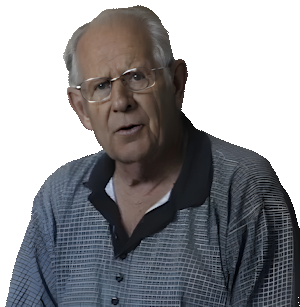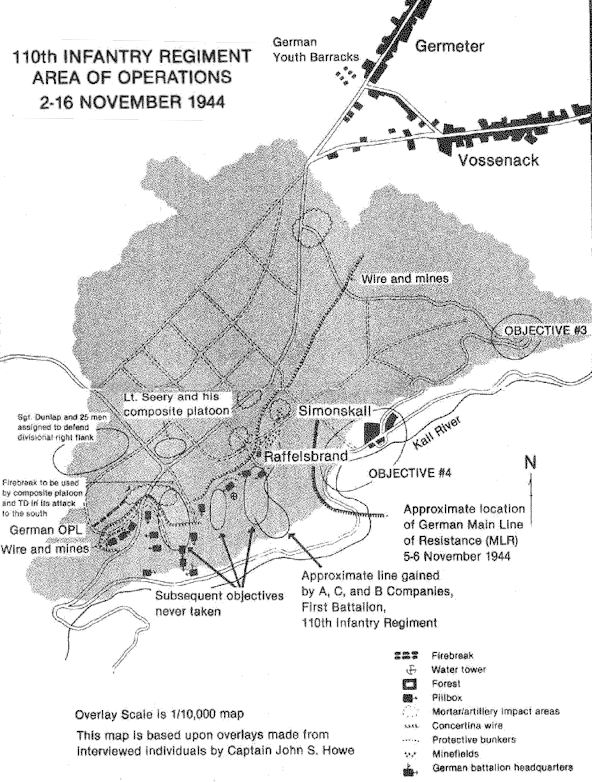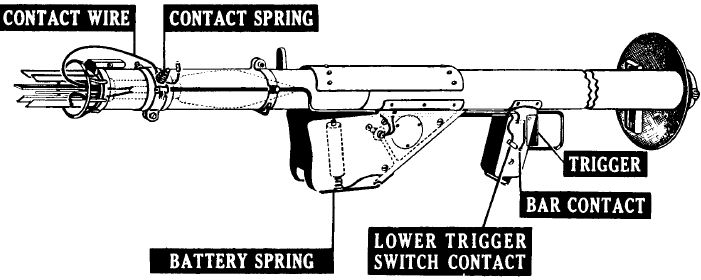Co. B, 110th Infantry Regiment, 28th Infantry Division
The following is a partial transcript from an interview done by the Veterans History Project with Howard R Allard. Posted on the website of the Library of Congress:

I was in the 110th Regiment of the 28th Division, and it was a cold but clear day on November 10, 1944, when our company commander ordered everyone to prepare to move out. The woods were covered with snow. In fact, it was the coldest winter that the Germans had ever recorded in history.
It had been a fairly quiet night. The usual shots were heard during the night, but no patrols had been encountered. Our orders were to infiltrate the enemy lines, attack and destroy the effectiveness of two pillboxes, which are gun emplacements made of thick concrete walls dug into the mountainside.
These pillboxes were directly in front of our position and provided an opening in the Siegfried Line, that strong defensive line on the German border. We were in the Hürtgen Forest near Schmidt and Vossenack. The 28th Division, of which I was a part, had broken through that absolutely impenetrable Siegfried Line, which protected Germany from all its invaders from the West.
Our mission then was to obtain control of these pillboxes to make it possible for the American Army to continue its invasion into Germany properly. Our B Company, the 110th Regiment of the 28th Division, moved toward our assigned goal in the early afternoon. The sun was covered by clouds and the temperature was dropping.

My squad, we moved toward our assigned positions. The plan was to move quietly through the German lines, reorganize and attack the concrete bastion from the rear. The movement through the German line was quiet and uneventful.
In fact, only a few rifle shots were heard throughout the afternoon and every squad was soon in their designated positions. Because the snow was about a foot deep, it was a simple matter to dig in and wait for further orders. The unit with the fire shooting bazooka made the first attack and immediately silenced all activities in pillbox number one.
However, the German soldiers in pillbox number two called for artillery and mortar fire and things got noisy and rough. We too had mortar support, which protected our flanks, but the mortar shells only bounced off the solid concrete walls of the pillbox. Our troops began to suffer heavy casualties while we were pinned down by the enemy.
Then the bazooka failed. Several attempts were made to send a runner back for new batteries, but each of these attempts failed. So it was decided to stay down, dig in and wait for darkness.

Several large logs and an abandoned American tank offered some protection for the diminished number of survivors of the heavy shell fire. There was no screaming or other sounds to indicate when a shell took a victim, but the still bodies told the tale. As darkness arrived and there was no moon, it was black dark.
We began to call and whisper to others to see who were still alive. Out of over 200 that started the attack that early afternoon, seven of us began our trek home. The soldier in charge was a sergeant and I was the next ranking soldier, a private first class.
The sergeant took the lead carrying a Browning automatic rifle and I brought up the rear with the same kind of weapon. The going was rough and our hearts were in our throats as we tried to move back to our lines without a sound. We all shared the wonder of why God had spared us, but in single file we knew it would be a difficult night and every step would be fatal.
As we began to cross the road, which we knew we had to cross to move back to our lines, we heard German footsteps. They wore heavy, noisy boots. The first five of our group got across the road before the Germans got too close.
The last two of us decided we better not try to cross the road before the enemy passed, so we waited in silence. The two German soldiers stopped right above us as though they had heard a sound.
We waited a long time, we smoked a cigarette, but finally tromped down the road. We waited until we could no longer hear their footsteps. Then the two of us made our way across the road to try to catch up with our buddies. It was so dark we dared not call out, so we decided to go on our own.
Almost crawling through the woods, we moved slowly but carefully in the direction of our friendly forces. No stars guided us, no landmarks to steer by, just dead reckoning in the grace of God. We never heard from our five fellow soldiers again. They were not taken prisoner to my knowledge and were never reported as returned to duty. My companion was Pedro (?Pedro L Gonzalez?), a Mexican fellow about my age who spoke only broken English. Together we wormed our way back up the hill.
It was icy and suddenly Pedro slipped and began sliding down the icy hill. This brought shouts of halt from the enemy unfriendly forces nearby. The air was immediately full of German conversation as they searched for their enemy.
What to do? Where to hide? The thoughts whirled through my mind as I lay still as possible. The area was then teeming with German soldiers excitedly conversing when suddenly Pedro was located. Screams of joy echoed through the night while the searchers continued for whoever else might be around.
Little did I know there were only two of us. Should I try to shoot my way out? Where could I go? Could I get away? Will they start shooting before I can? Should I give up? The questions whizzed by as I tried to think. No one was speaking English and I spoke no German.
But that indecision came suddenly to an end as I felt a German boot in my back. I too had been discovered. More cries of glee, fast German conversation and orders that indicate I should stand up and give up my weapon.
At that moment I experienced the feeling of complete helplessness knowing that for the immediate future I must relinquish the freedom I had so much cherished and had been willing to give my life for and learn to submit every moment to my captor's whim and to be willing to leave my future in the hands of God. I've learned to accept what I've said in Philippines 411. I've learned to be content with whatever the circumstances.
I did think a lot during those moments about my parents. This was November the 10th. On November the 4th, 1944, my parents had celebrated their 25th wedding anniversary.
Our dad had written that he was giving mother a new wristwatch from us boys. And there we were. My oldest brother aboard a troop ship bound for the China Burma theater.
My twin brother on the front line just a few miles from me later wounded in the Battle of the Bulge and me now listed as missing in action. What an exciting 25th anniversary for our parents.
Our company B was composed of 250 men. Twelve of those on November 10th, 1944 were assigned to guard duty at regimental headquarters and other soldiers were on company detail, cooks, clerks, and so forth. So they did not take part in our skirmish. At the end of that fruitful day, except those who did not participate, Pedro and I were all that was left of Company B, 110th Regiment of the 28th Infantry Division.

HOWARD R. ALLARD Jr., born July 8, 1925 in Willows, CA.
Drafted Oct. 14, 1943 and served with the US Army, Inf. Co. B, 110th Regt.. 28th Inf. Div.
Basic training at Fort Benning, GA. Served with 86th Div. at Camp Livingston, LA.
Went overseas as replacement in B Co., 110th Regt., 28th Inf. Div.
Front line near Schmidt (Germany) in a pillbox dotted area called Raffelsbrand southwest of Vossenack, along the Aachen Siegfried Line.
Nov. 10, 1944 Co. B attempted to clear two pillboxes. His company was destroyed and he was taken prisoner.
Prison camps include: Stalag 12A (Limburg), Stalag 4B (Muhlberg) and Stalag 4F (near Glauchau, Germany).
Worked in factory. Liberated April 14, 1945 by Gen. Patton's 3rd Army.
Separated as sergeant at Fort Ord, CA on Dec. 13. 1945.
Married to Wanda in 1949 and has four children and nine grandchildren.
Allard was awarded the POW Medal, Bronze Star and Combat Infantry Badge.
Civilian employment as elementary school principal. He retired in 1985.
